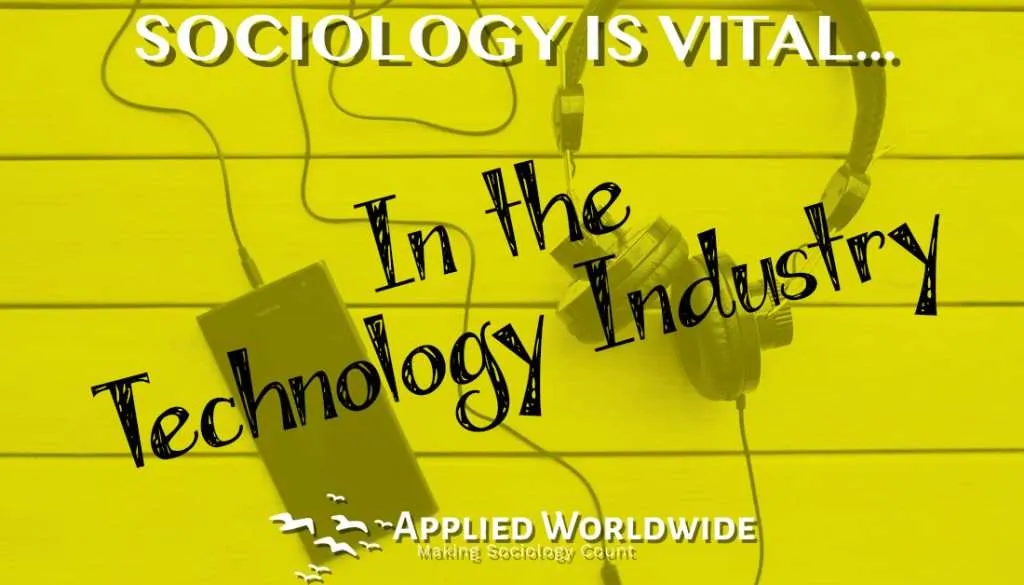Second Domain Analysis of Sociology Jobs in the Tech Industry
Despite recent layoffs from some of the major tech companies in the US, job openings in tech are still popping up frequently, making the fast-evolving tech industry a great place for sociologists to make a difference.
There are a variety of ‘sociology jobs’ in the tech industry, and as Iga Kozlowska writes, “Sociologists, The Tech Industry Needs You!” Be sure to read Kozlowska’s article in reference to the type of skills needed in various technology careers, based on her experience working for Microsoft. For many of us, though, we do not have such first-hand experience, which is why the second-domain analysis is important.
In the world of applied sociology, we often talk about domains. A second domain would be an area or industry in which you are applying knowledge from your first domain (presumably, sociology). For an applied sociologist in training, conducting a second-domain analysis can be quite valuable in knowing the experiences and training needed in graduate school to prepare us for our future jobs in extra-academic domains.
Domain analyses should include research into job prospects, necessary skills and experiences, and information about expected salary. In this piece, I conduct a second-domain analysis focusing on the sociological skills required to find work in the current tech industry. You may also enjoy our second-domain analysis of the healthcare industry!
Sociology Jobs in the Tech Industry
Without further delay, here are a few of the most notable sociological skills that are valuable to tech companies. You can conduct your own second-domain analysis of the tech industry by following the links to job postings at Google, Apple, Microsoft, Netflix, Facebook, and Twitter. In this analysis, I only include job postings that explicitly state “sociology” as an appropriate educational background for the position. One note about level of education is that most of these positions require a minimum of a BA or BS in sociology, but prefer an MS, MA, or PhD.
Research Methods and Sociology Jobs in the Tech Industry
It is obvious that research methods are the most sought after skillset for sociologists in the tech industry. Whether it is quantitative, qualitative, or mixed-methods, tech companies are looking for employees with sociological research methods.
Quantitative Research
All six of the companies reviewed have a current job listing for quantitative researchers with a background in sociology. In these postings quantitative research skills are often divided into design and analysis, with most positions requiring experience in both. For example Facebook’s job posting for a Quantitative UX Researcher lists both, “Knowledge of research methods and experience in at least one subset of methods (e.g., survey design and quantitative data analysis).”
Apple’s posting for an Employee Survey Program Manager suggests experience with SAS, SPSS, Stata, or R, and Netflix asks for experience with Python or R in their posting for Senior Research Scientist, suggesting these are valuable programs to know. As far as data collection software, Microsoft’s posting for a User Researcher suggests Qualtrics is a program to know.
Qualitative Research
While quantitative research is in demand in tech companies, there are plenty of opportunities for qualitative researchers as well. Like its quantitative counterpart, all six companies have job postings listing qualitative research skills as a requirement.
Unlike quantitative research, there were less “qualitative-specific” job postings, with many falling in the mixed-methods category, which I discuss below. Again, Facebook at the time of writing has a job listing for a Qualitative UX Researcher. Alternatively, Twitter lists in-depth interviews and ethnographic field research as required skills for their Sr. User Researcher job listing, and a listing for Employee Survey Program Manager at Apple suggests qualitative research design as a preferred skill.
Mixed-Methods Research
Nearly all of these companies have some indication that mixed-methods research is valuable. Facebook offers a position specifically as a Mixed-Method Strategy Researcher, but other positions also suggest mixed-methods are important. For instance, Google’s posting for a Quantitative User Experience Research Lead suggests, “Experience collaborating with qualitative UX researchers” is a preferred qualification, while Netflix’s posting for a Sr. Quantitative UX Researcher similarly states, “qualitative is a plus!”
For their Principle Design Research Lead position, Microsoft lists the following mixture of research methods as preferred requirements: “Well established portfolio of research techniques from ethnography, field studies, interviews, evaluative usability studies, concept validation, user journey mapping, surveys, scorecards and competitive analysis.”
Review of Research Methods
Overall, the most frequently mentioned skill in sociology-related job postings at major tech companies is survey and experimental research. Designing these research projects appears the most important skill with analysis frequently mentioned, simultaneously. With that said, there was a surprising amount of qualitative requirements for many of these jobs, most notably ethnography and in-depth interview experience.
While many of these job listings require 3-10 years experience using these skills, there are two examples where these companies explicitly mention academic experience as qualifying. One example is Apple’s posting for Employee Survey Program Manager which states, “five years experience in applied survey research (this could include work during graduate studies),” and another is Google’s posting for a User Experience Researcher suggesting “experience in a variety of product spaces, applied research and/or academic settings,” is a preferred qualification.
Sociological Theory and Sociology Jobs in the Tech Industry
Unlike research methods, sociological theory is less explicit in job postings at major tech companies. However, there is evidence that theoretical knowledge is valuable to these companies. For example, a management position at Twitter suggests, “understanding of global geopolitical and social issues and threats to/from different regions of the world” is a preferred qualification.
By understanding how sociological theory can inform the jobs requirements listed, you can harness your sociological knowledge to provide an impressive and unique perspective in the interview process—one that only a sociologist could provide.

Moving Beyond Sociology Skills
In addition to research methods and theory, I want to end by highlighting two valuable professional experiences that we can all work toward in graduate school. The first is social media. Nearly all of these companies are hiring positions that require skills in social media. For instance Twitter’s managerial postings suggest being, “knowledgeable of social media monitoring tools as well as open source investigative tools and techniques,” as a qualifying skill. Microsoft has an entire post-doc program for those conducting social media related research.
The second professional development skill that is frequently cited is collaboration. Whether it is collaboration between qualitative and quantitative UX researchers or collaboration between people of different departments, working with (or leading) others is a valuable skill for many sociology jobs in the tech industry.







